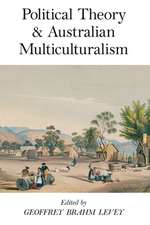Internal Colonialism: The Celtic Fringe in British National Development
Autor Michael Hechteren Limba Engleză Paperback – 30 sep 1998
| Toate formatele și edițiile | Preț | Express |
|---|---|---|
| Paperback (1) | 444.08 lei 6-8 săpt. | |
| Taylor & Francis – 30 sep 1998 | 444.08 lei 6-8 săpt. | |
| Hardback (1) | 1054.71 lei 6-8 săpt. | |
| Taylor & Francis – 14 iul 2017 | 1054.71 lei 6-8 săpt. |
Preț: 444.08 lei
Nou
Puncte Express: 666
Preț estimativ în valută:
84.98€ • 88.94$ • 70.73£
84.98€ • 88.94$ • 70.73£
Carte tipărită la comandă
Livrare economică 31 martie-14 aprilie
Preluare comenzi: 021 569.72.76
Specificații
ISBN-13: 9780765804754
ISBN-10: 0765804751
Pagini: 422
Dimensiuni: 152 x 229 x 24 mm
Greutate: 0.64 kg
Ediția:Revised
Editura: Taylor & Francis
Colecția Routledge
Locul publicării:Oxford, United Kingdom
ISBN-10: 0765804751
Pagini: 422
Dimensiuni: 152 x 229 x 24 mm
Greutate: 0.64 kg
Ediția:Revised
Editura: Taylor & Francis
Colecția Routledge
Locul publicării:Oxford, United Kingdom
Cuprins
1 INTRODUCTION 2 TOWARDS A THEORY OF ETHNIC CHANGE Part II Core and Periphery in the Pre-Industrial Era 3 THE EXPANSION OF THE ENGLISH STATE 4 THE CONSEQUENCES OF POLITICAL INCORPORATION Part III The Consequences of Industrialization 5 INDUSTRIALIZATION AND REGIONAL ECONOMIC INEQUALITY, 1851-1961, 6 THE ANGLICIZATION OF THE CELTIC PERIPHERY, 1851-1961, 7 THE PERSISTENCE OF SECTIONALISM, 1885-1966, 8 SERVITOR IMPERIALISM AND NATIONAL DEVELOPMENT IN AN AGE OF EMPIRE 9 TWENTIETH-CENTURY CELTIC NATIONALISM 10 THE POLITICAL ECONOMY OF ETHNIC CHANGE 11 CONCLUSION
Descriere
Recent years have seen a resurgence of separatist sentiments among national minorities in many industrial societies, including the United Kingdom














